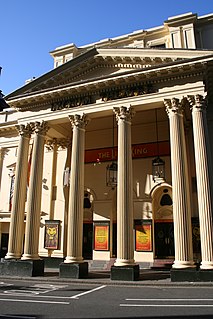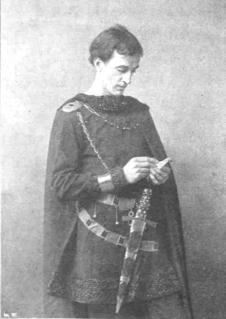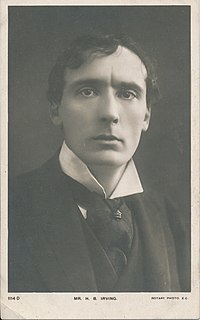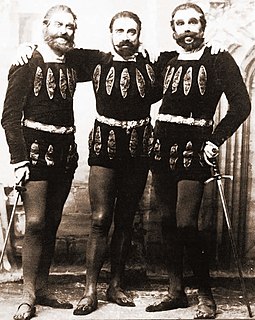
Dame Alice Ellen Terry,, was a leading English actress of the late 19th and early 20th centuries.

Sir Henry Irving, born John Henry Brodribb, sometimes known as J. H. Irving, was an English stage actor in the Victorian era, known as an actor-manager because he took complete responsibility for season after season at the West End’s Lyceum Theatre, establishing himself and his company as representative of English classical theatre. In 1895 he became the first actor to be awarded a knighthood, indicating full acceptance into the higher circles of British society.

Laurence Sydney Brodribb Irving was an English dramatist and actor. He died along with his wife, Mabel, in the RMS Empress of Ireland disaster.

William Terriss, born as William Charles James Lewin, was an English actor, known for his swashbuckling hero roles, such as Robin Hood, as well as parts in classic dramas and comedies. He was also a notable Shakespearean performer. He was the father of the Edwardian musical comedy star Ellaline Terriss and the film director Tom Terriss.

Sir John Martin-Harvey, known before his knighthood in 1921 as John Martin Harvey, was an English stage actor-manager.

The Lyceum Theatre is a West End theatre located in the City of Westminster, on Wellington Street, just off the Strand in central London. It has a seating capacity of 2,100. The origins of the theatre date to 1765. Managed by Samuel Arnold, from 1794 to 1809 the building hosted a variety of entertainments including a circus produced by Philip Astley, a chapel, and the first London exhibition of waxworks by Madame Tussauds. From 1816 to 1830, it served as The English Opera House. After a fire, the house was rebuilt and reopened on 14 July 1834 to a design by Samuel Beazley. The building is unique in that it has a balcony overhanging the dress circle. It was built by the partnership of Peto & Grissell. The theatre then played opera, adaptations of Charles Dickens novels and James Planché's "fairy extravaganzas", among other works.

Sir Francis Robert Benson, known professionally as Frank Benson or F. R. Benson, was an English actor-manager. He founded his own company in 1883 and produced all but two of Shakespeare's plays. His thirty-year association with the Shakespeare Memorial Theatre and the annual Shakespeare Festival in Stratford-upon-Avon laid down foundations for the creation of the Royal Shakespeare Company after his death.

Harry Brodribb Irving, was a British stage actor and actor-manager; the eldest son of Sir Henry Irving and his wife Florence, and father of designer Laurence Irving and actress Elizabeth Irving.

William Lugg was an English actor and singer of the late Victorian and Edwardian eras. He had a long stage career beginning with roles in several Gilbert and Sullivan operas and continuing for over four decades in drama, comedy and musical theatre. Later in his career, he appeared in nine silent films in the early years of British cinema.
The Lyons Mail is a 1931 British mystery film directed by Arthur Maude and starring John Martin Harvey, Norah Baring, and Ben Webster. It was based on the 1877 play The Lyons Mail by Charles Reade which in turn was based on his 1854 play The Courier of Lyons. The film was also released under the alternative title Courrier de Lyon. The story is based on the Courrier de Lyon case. Filmed in 1930, it was to be leading actor John Martin-Harvey's only sound film.

Henry Hawes Craven Green was an English theatre scene-painter. He collaborated with Henry Irving, Richard D'Oyly Carte and Herbert Beerbohm Tree, producing stage sets of unprecedented realism. Craven's career lasted from 1853 to 1905, spanning the end of the era of gas lighting in theatres and the beginning of electrical lighting; he developed new techniques to co-ordinate the appearance of theatre settings during the transition from gas to electricity. He was regarded as the finest scene-painter of his day and was the last major scenic designer in the ultra-realistic tradition.
The Lyons Mail is a 1916 British silent film based on the 1877 play The Lyons Mail by Charles Reade, a very popular stage work of the Victorian era. A respectable French gentleman is mistaken for his doppelganger, a notorious highwaymen.

The Bells is a play in three acts by Leopold David Lewis which was one of the greatest successes of the British actor Henry Irving. The play opened on 25 November 1871 at the Lyceum Theatre in London and initially ran for 151 performances. Irving was to stage the play repeatedly throughout his career, playing the role of Mathias for the last time the night before his death in 1905.
The "Courrier de Lyon" case is a famous French criminal case. It occurred during the French Revolution. During the night of 27 and 28 April 1796, a mail coach was ambushed outside Paris by several men who stole a large sum of money. The stage coach was supposed to go to Lyon from Paris, carrying money for the Army of Italy. Both the driver and the armed guard were brutally killed. A third man on board, travelling under an assumed name, participated in the killing and later vanished.

The Lyceum Theatre was a theatre in New York City located on Fourth Avenue between 23rd and 24th Streets in Manhattan. It was built in 1885 and operated until 1902, when it was torn down to make way for the Metropolitan Life Insurance Company Tower. It was replaced by a new Lyceum Theatre on 45th Street. For most of its existence, the theatre was home to Daniel Frohman's Lyceum Theatre Stock Company, which presented many important plays and actors of the day.
The Courier of Lyons is a play by the English writer Charles Reade, which was first performed in 1854. He based it on the 1796 Courrier de Lyon case in Revolutionary France, drawing inspiration from a previous play based on the case by the French writers Paul Siraudin and Louis-Mathurin Moreau.

Samuel Johnson was an actor-manager and Shakespearean actor of the 19th century and a member of Henry Irving's Company at the Lyceum Theatre, for which he played the comedic roles.

William Haviland was a British actor-manager specialising in the works of Shakespeare who during his long stage career performed with some of the leading actors of his time including Henry Irving and Herbert Beerbohm Tree.

Amy Coleridge was a British actress who had a successful career playing in Shakespeare's plays in South Africa as well as in her home country. She acted in the companies of Henry Irving and John Martin-Harvey.

Mabel Lucy Hackney was a British actress and the wife of the dramatist and actor Laurence Irving and daughter-in-law of the actor Henry Irving in whose company she acted before she joined that of her husband. She died along with her husband in the RMS Empress of Ireland disaster in 1914.




















